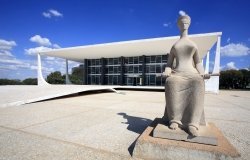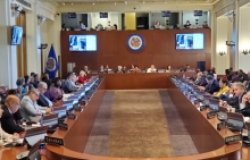The Quality of Democracy in Latin America
Overview
Summary of a meeting with Kurt Weyland, Associate Professor of Government, University of Texas at Austin; Jonathan Hartlyn, Professor of Political Science, University of North Carolina, Chapel Hill; Christopher Sabatini, Senior Program Officer, National Endowment for Democracy; and Arturo Valenzuela, Professor of Government, Georgetown University.
In the past decade, Latin American countries have experienced economic openness and democratic reforms. Kurt Weyland started by stating that neo-liberal reforms have both strengthened and weakened the quality of democracy in Latin America (LA). On the one hand, free trade has strengthened democracy because of international and local factors. Influential nations, like the United States (US), have pressured Latin American nations to become more transparent and democratic through trade policies that promote openness and accountability. By being more susceptible to external pressures from the US and other nations, Latin American democracies have benefited in that these pressures have compelled governments to become more democratic. Local factors have also contributed to reforms in the age of neo-liberalism. Neo-liberal elites have strengthened their position and are less worried about leftist groups, thereby allowing for more infusion of investment by international businesses that do not fear backlashes as often happened in the past.
On the other hand, neo-liberalization has limited the value of democracy in that governments have less latitude when addressing the needs of the people that elect them, especially due to pressure from international agents such as corporations and international organizations. Increasingly, we can see that, due to external pressures, governments are forced to satisfy the interests of businesses rather than the needs of the people. Understandably, this has led to an increased level of cynicism from an already distrustful populace. In sum, deregulation has weakened civil societies, unions and political parties, all of which are important elements in the implementation of a vibrant pluralistic democracy.
Professor Jonathan Hartlyn concentrated on the importance of free and fair elections in Latin America. Based on a methodological study of various cases, he identified four major factors in explaining the outcome of elections in LA. They are: 1) The behavior of political parties and leaders by giving special attention to incumbent administrations; 2) the role of crucial state institutions such as the judiciary; 3) the role of domestic civil society and the mass media on reporting results; and 4) presence of international actors whose mission is to deter fraud.
Hartlyn found that while international monitoring has become common in LA by having a positive effect on elections, electoral processes are far from consolidated. Due to international and local scrutiny different and more sophisticated kinds of fraud are apparent, according to Hartlyn. There have been three types of consolidation: rapid, gradual and incomplete. Nations that have experienced gradual consolidation include Mexico and the Dominican Republic, while those with incomplete consolidation are Nicaragua, Haiti and Guyana.
In his commentary, Chris Sabatini stressed the fact that there were economic and electoral reasons why democracies were not as strong as they should be; however, he argued that the historical weakness of state institutions and inability of governments to respond to social demands are more overwhelming factors that explain this trend.
Arturo Valenzuela stressed the importance of not forgetting the hard realities recently faced by Latin American democracies. Only a few years ago much of Latin America was under dictatorship and now we are talking about the quality of democracies. It is important to remember that many nations are only beginning to experiment with democracy and are in the early stages of implementing political institutions. The consolidation of democracy is a long and arduous process and LA still needs to address issues concerning rule of law, electoral legitimacy and corruption.
by Luis Guevara
Hosted By

Latin America Program
The Wilson Center’s prestigious Latin America Program provides non-partisan expertise to a broad community of decision makers in the United States and Latin America on critical policy issues facing the Hemisphere. The Program provides insightful and actionable research for policymakers, private sector leaders, journalists, and public intellectuals in the United States and Latin America. To bridge the gap between scholarship and policy action, it fosters new inquiry, sponsors high-level public and private meetings among multiple stakeholders, and explores policy options to improve outcomes for citizens throughout the Americas. Drawing on the Wilson Center’s strength as the nation’s key non-partisan policy forum, the Program serves as a trusted source of analysis and a vital point of contact between the worlds of scholarship and action. Read more
Thank you for your interest in this event. Please send any feedback or questions to our Events staff.









